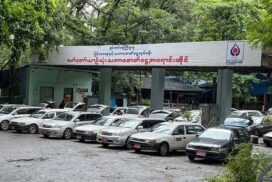
The number of people queuing at the filling stations has fallen significantly and customers can now purchase as they need, according to one survey.
There are only four or five cars waiting at most of the stations.
“There are not many queues to buy petrol. Some stations have returned to normal with four or five cars and some have a shorter queue,” said a businessman who had just bought fuel.
Customers can now buy according to their needs, said Ko Lin Aung, a taxi driver.
“We used to have a queue of about 100 cars at the station. Now, there are not many queues and we can fill as required. They don’t sell by the bucket. Taxi drivers like me can now take more trips. It is more convenient,” he said.
After inspecting the bowsers and fuel storage at the Thilawa jetty, Yangon Chief Minister U Soe Thein urged on 12 December that systematic and speedy procedures be adopted to fill the browsers and arrange their departures to the stations.
The total adequate supply of motor fuels for public transport and general use in the Union Territory Nay Pyi Taw, Yangon and Mandalay regions on 11 December amounted to about two million gallons, including more than 600,000 gallons of 92 Ron, more than 400,000 gallons of 95 Ron, more than 400,000 gallons of diesel and more than 500,000 gallons of premium diesel, according to a statement from the State Administration Council.
With the remaining stock and continuous arrivals of oil tankers, fuel shortages are impossible and people can easily purchase as much as they require without any concern, it stated.
Arrangements are being made for convenient purchase of any type of transport fuels whenever and wherever it is actually needed by the public in a short time. Moreover, the authorities are taking measures to detect and effectively punish those who resell fuels after several queues at the stations and those who illegally store motor fuels.
MT/ZN














